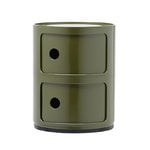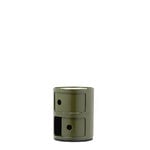Designed in 1969, the Componibili storage unit by Kartell is a design classic that keeps on charming new friends. The storage unit is suitable for various uses and fits all kinds of decors. Place Componibili in the bedroom, living room or kitchen – thanks to its durable plastic surface, it is also ideal for the bathroom or balcony. The Componibili was designed by Anna Castelli Ferrieri and is a part of the permanent collections of the MoMA in New York and the Pompidou Centre in Paris.


Componibili storage unit, 2 modules, green
Kartell
Description
Designed in 1969, the Componibili storage unit by Kartell is a design classic that keeps on charming new friends. The storage unit is suitable for various uses and fits all kinds of decors. Place Componibili in the bedroom, living room or kitchen – thanks to its durable plastic surface, it is also ideal for the bathroom or balcony. The Componibili was designed by Anna Castelli Ferrieri and is a part of the permanent collections of the MoMA in New York and the Pompidou Centre in Paris.
Product details (4)
- Colour
- Green
- Height
- 40 cm
- Diameter
- 32 cm
- Material
- ABS
- Product ID
Designer
The Italian architect and industrial designer Anna Castelli Ferrieri was the first woman to graduate from the prestigious Polytechnic of Milan. In the year 1949 she founded Kartell, together with her husband Giulio Castelli, in order to produce high-quality design products out of plastic.
Read moreReviews (2)
5
Based on 2 reviews
-
M
MARCIO B
The product is a classic design with a new and amazing color
475 days ago
-
M
Maria B
Awesome product! Kids loved it!
368 days ago
Sustainability
The Product Sustainability Framework, our criteria of sustainable design, helps you find the most sustainable products in our selection. Read below which sustainability criteria this product has met.
Working conditions & labour 9/9
-
Equal opportunities for all employees
-
Commitment to UN Global Compact, fair compensation for all employees
-
Corporate responsibility requirements defined and communicated for suppliers
-
Systematic work for improved inclusion and well-being in the workplace
-
Transparent supply chain
-
Suppliers' compliance to a code of conduct ensured
-
Direct suppliers audited and certified
-
Compliance to the UN Guiding Principles on Business and Human Rights ensured in the supply chain
-
Support for community involvement in the supply chain
Eco-friendly production 8/9
-
Fair and resource-wise water-use in production
-
No incineration or landfilling of returned items
-
No use of endangered species as materials
-
No direct environmental emissions or waste (excl. GHGs) from production
-
The sustainability of direct suppliers' production is addressed and monitored
-
Production and material sourcing that respect biodiversity, animal rights, and natural ecosystems
-
Material-efficient and ecological packaging
-
No potentially harmful chemicals used in own production
Climate impact 4/8
-
Company's direct greenhouse gas emissions identified and commitment to reduction
-
Product's carbon impact identified and commitment to reduction
-
Guidance on energy- and eco-efficient use of the product
-
Contribution to climate initiatives beyond the brand’s direct operations
Sustainable materials 5/6
-
Sustainable and long-lasting material choices
-
No harmful or hazardous substances
-
Responsible raw material sourcing and production
-
Materials suited for circularity: monomaterials, recyclable finishings, renewable or recycled contents etc.
-
Ecological materials: natural, biodegradable, recyclable or recycled contents
Circular design 4/5
-
High aesthetic quality promoting long-term use of the product
-
Technically durable product design and material choices
-
Design for enduring life-long quality
-
Design and support for product maintenance, repair and upgradability





